Physical Address
304 North Cardinal St.
Dorchester Center, MA 02124
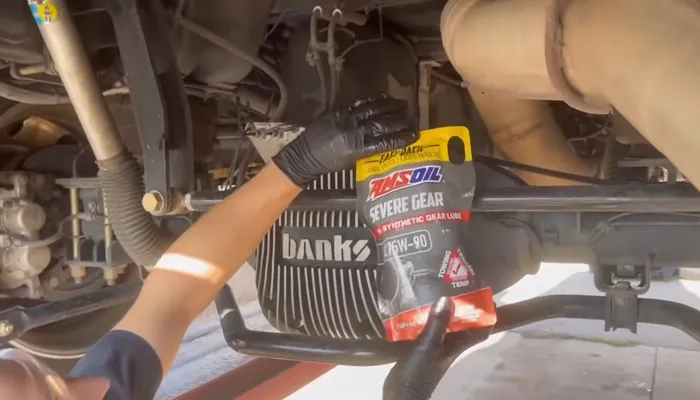
When towing a heavy load, your car’s transmission and gear systems work harder than normal. This can cause heat, corrosion, and wear if the suitable gear oil isn’t used. Not using the best gear oil for towing can lead to expensive repairs to your car’s drivetrain components.
Gear oil protects your car’s transmission from the added stress of towing. It is thicker than ordinary engine oil, which helps keep your gears lubricated while you tow. Plus, it has special additives that protect against wear and corrosion. Now how do you find authentic gear oil?
We will share with you the top five differential/gear oils most suitable for towing. This article also explains how to change the gear oil in your car. Let’s get started.

The answer is no. Towing a car without gear fluid can damage the transmission and cause all sorts of other problems. It’s important to make sure that your car is in neutral before you tow it, otherwise, you could end up doing serious damage.
So if your car has broken down, check the level of your gear fluid before attempting to tow it. Otherwise, you could be in for a very costly repair bill.
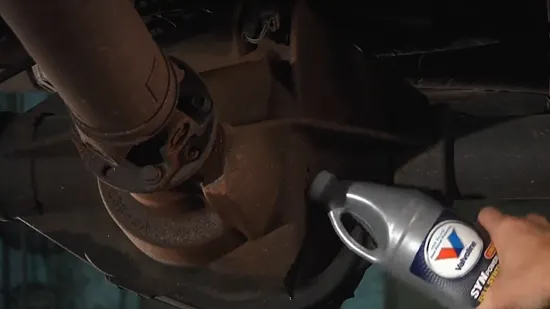
Differential fluid is vital to keeping your car running smoothly. It helps to lubricate the differential and keeps it from overheating.
Using incorrect differential fluid, you may damage the differential and cause it to fail. Even a master mechanic may not be able to reverse the damage by flushing the fluid. You may have to replace the damaged components and refill the diff with the recommended fluid.
Using the wrong diff fluid can be costly and cause a lot of headaches. Make sure you use the right fluid for your car to avoid any problems down the road.
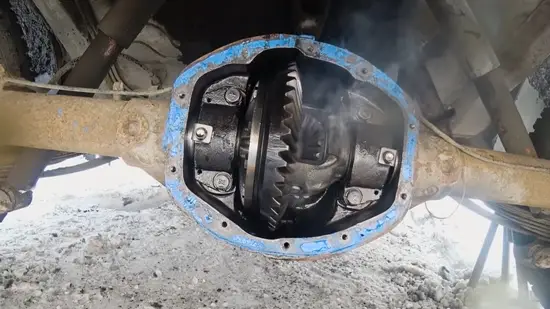
Gear oil helps to lubricate the gears in your car, and it also helps to cool them. Over time, the oil can become dirty or degraded, which can cause a number of problems.
If you notice any of these symptoms, it’s important to take your car to a mechanic to have the oil changed.
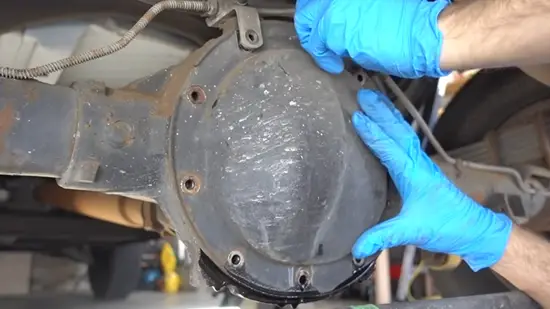
The answer may depend on a few factors, such as the type of trailer being towed and the conditions of the roads.
For example, if you’re towing a heavy trailer on rough roads, thicker gear oil may be necessary to protect your gear from wear and tear. On the other hand, if you’re towing a lightweight trailer on smooth roads, a lighter oil may be sufficient.
Ultimately, it’s important to consult with an expert before choosing the best transmission fluid for towing for your situation. Most experts recommend using a thicker gear oil, such as 85w-140. The following two gear oils are all suitable for heavy load towing:
Highlighted Features:
About This Product:
The Lucas oil heavy duty gear oil SAE 85w-140 is an excellent choice for those who need good gear oil for towing. This gearbox oil is made of a blend of materials that prevent rusting and is designed to fit hypoid gears.
This oil is also ideal for shock-loading applications. It comes in a 1-quart bottle and is affordably priced. A variety of vehicles can also be fitted with this product, as it is a specific automobile product.
What Makes This Product Helpful?
If you’re looking for top-quality gear oil without a high price tag, Lucas gear oil is the perfect product for you. This oil limits leakage from difficult to replace gaskets and provides excellent lubrication for your car.
Besides towing metallic parts with a smoother running, this product is also suitable for other applications. Traveling over long distances can cause these parts to break down, but Lucas gear oil will help keep them in working order.
Highlighted Features:
About This Product:
Royal Purple 85w140 synthetic gear oil for heavy duty towing that is designed for truck and automotive front or rear differentials, manual transmissions, and lower gear units of marine engines.
It is formulated with a friction modifier additive, which reduces drag in the drive train and results in better gas mileage. Max Gear also outperforms ordinary gear oils by providing superior corrosion protection and more extended gear and bearing life.
What Makes This Product Helpful?
Royal Purple’s MaxGear is a high-performance, synthetic gear oil created for trucks, vans, SUVs, classic cars, and other vehicles that need protection against wear. Increased horsepower and long bearing and gear life are the benefits of this product.
This product also reduces operating temperature and has a lower coefficient of friction. Besides providing superior corrosion protection, MaxGear rapidly separates from water and meets the manufacturer’s requirements. Formulated for limited-slip differentials and eco-friendly.
These two gear oils are both suitable for heavy-duty towing. Choose the one that best suits your needs and budget.
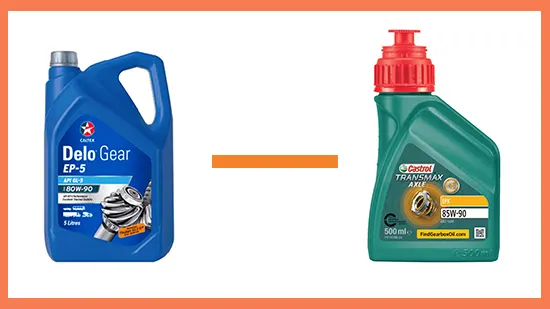
Gear oil and differential oil may seem interchangeable, but there are some crucial differences between the two. Differential oil, also known as gear oil, is a type of lubricating oil that is used to prevent damage to metallic components and increase overall performance.
Gear oil is thicker than engine oil, which helps it to protect the moving parts of a machine better. In addition, gear oil helps to make it easier for cars to make corners by reducing friction. And gear oil is an essential component of any car.
So next time you’re under the hood, be sure to use the correct type of oil for your car. You can check out the following three gear oils for your towing needs:
Highlighted Features:
About This Product:
Valvoline high performance SAE 80w 90 gear oil protects gears against severe temperatures and shock loads. To minimize gear wear, the oil has extreme-pressure additives.
In passenger cars, light trucks, vans, sport utility vehicles, and heavy-duty trucks with API-GL5 or GL-4 fluids, it’s recommended for conventional hypoid differentials and non-synchronized manual transmissions.
The oil has a flash point of 394° C and a liquid volume of 1 quart. Also designed to prevent gear wear due to scuffs, corrosion, scouring, and pitting.
What Makes This Product Helpful?
For automotive differentials and other applications that require gear oil, Valvoline SAE 80W-90 Gear Oil can be a good choice. This gear oil is trusted by many and has been used for decades.
The installation is simple, and it works well. It is also an excellent choice for teaching young, soon-to-be-driving teenagers some vehicle maintenance. This gear oil comes in 1 qt bottles, which are convenient for small jobs.
Highlighted Features:
About This Product:
When towing a trailer or boat, you need a gear oil that can handle the extra stress on your vehicle. ULTRA 1PLUS 75w140 gear oil for towing is designed for just that. It’s tough enough to handle the extra stress of towing while still providing superior lubrication.
With its synthetic base oils and specialty performance additives, ULTRA 1PLUS gear oil can keep your gears running smoothly in any condition. So if you’re looking for gear oil that can withstand the rigors of towing, ULTRA 1PLUS UFS75140GL5L is the one for you.
What Makes This Product Helpful?
Ultra 1PLUS gear oil improves thermal and oxidative stability at high temperatures in various conditions. Aside from providing exceptional all-weather performance, it also meets or exceeds SAE J306 viscosity requirements and API GL-5 and MT-1 performance requirements.
It can also be used with conventional and limited slip differentials. With this in mind, ULTRA 1PLUS is the ideal gear oil for extreme conditions that provide maximum protection and performance.
Highlighted Features:
About This Product:
Mobil 1 75w90 synthetic gear oil is a superior product for motor bushings, valve gear, side rods, bearings, and draft gear boxes.
With its extended lubrication period, this oil is well suited for use on diesel locomotives, electric locomotives, and steam locomotives. Plus, its high-quality formulation means it can also be used on other types of rolling stock.
What Makes This Product Helpful?
Mobil 1 104361-UNIT is a synthetic lube that helps protect your vehicle against wear and tear. It also helps keep your engine running smoothly, even under extreme conditions.
This gear oil is formulated to resist the breakdown of lubricating properties at high temperatures, ensuring your car’s gears are well-protected. It’s also designed to work well with limited-slip differentials.
While there are many gear oils on the market, these three products stand out as the best gear oils for towing. Each one is designed for a specific purpose and can provide your vehicle with the protection it needs when towing a heavy load.
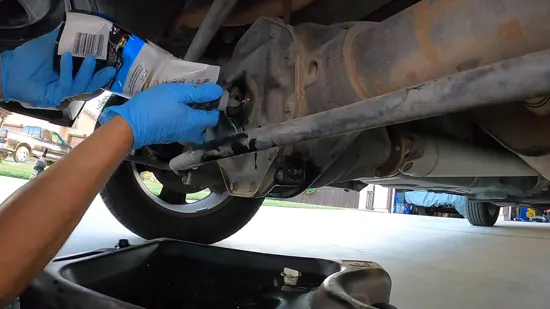
Different brands of gear oil have different characteristics, and mixing them can result in sub-optimal performance. Mixing gear oils from different brands can result in poor performance since each brand is formulated for a specific purpose.
The viscosity of different gear oil brands varies, and mixing them may cause the gears to overheat or break down prematurely. For these reasons, using the same gear oil throughout the vehicle’s life is crucial. Vehicles can perform poorly with mixing different gear oils.
| Product | Viscosity | Material | Item Weight |
| Lucas Oil LUC10042 | 85W-140 | Synthetic | 2.03 Pounds |
| Royal Purple ROY01303 | 85W-140 | Synthetic | 2 Pounds |
| Valvoline VV831 | 80W-90 | N/A | 2 Pounds |
| ULTRA 1PLUS UFS75140GL5L | 75W-140 | Synthetic | 1.92 Pounds |
| Mobil 1 104361-UNIT | 75W-90 | Synthetic | 1.8 Pounds |
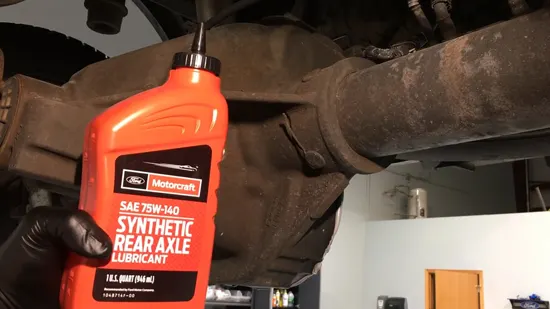
After reviewing the best gear oils for towing, it’s important to understand how to choose the right one for your vehicle. Here are a few factors to consider:
The viscosity rating of gear oil is determined by its ability to maintain a certain level of viscosity, or consistency, across a range of temperatures. In both hot and cold climates, the higher the VI, the more consistent the oil.
When choosing a gear oil, it is crucial to consider the conditions in which the oil will be used. For example, if the oil is exposed to extreme temperatures, then a high VI oil is necessary. To determine the VI of an oil, look for the “W” in the SAE designation.
For example, a gear oil with an 80W-90 viscosity rating has a higher VI than one rated 75W-90. The first number (75 or 80) is the oil’s low-temperature rating, while the second number (90) is its high-temperature rating.
When it comes to buying gear oil, one of the most important things to consider is the anti-scuffing additives. These additives help protect gears from wear and tear and can significantly extend your gear oil’s life. But how do you know which additive is suitable for your needs?
Considering your gearbox’s operating conditions is the first step. If you are subjecting the gears to heavy loads or high temperatures, you’ll need an additive that can stand up to those conditions.
Think about the type of metal your gears are made from. Some additives are explicitly designed for use with certain metals, so it’s important to choose an additive that’s compatible with your gearbox.
Take a look at what the manufacturer recommends. Many gearbox manufacturers will have a specific additive in mind when they design their products. Following their advice can help you choose an additive that will work best with your gearbox.
There are various ways to determine the slip receptivity of gear oil when you purchase it. One way is to ask the seller for their recommendation. Another way is to look for information on the product label.
The American Gear Manufacturers Association (AGMA) provides a standardized test method that can be used to determine a gear oil’s Slip Receptivity. This test measures the torque required to rotate a gear in an oil bath. A higher score indicates a better Slip Receptivity.
Gear oil compatibility is vital to consider when purchasing gear oil because the wrong oil can break down the gears in your machinery. To determine compatibility, you’ll need to consider the base oil, additives, and viscosity of the oil.
The base oil is the main component of the gear oil, and it can be either synthetic or mineral-based. Additives improve the performance of base oils, like anti-wear agents and corrosion inhibitors. Viscosity affects how well the oil lubricates the gears and how well it flows.
This range is determined by the operating temperatures of the gearbox, which can be affected by numerous factors such as the type of equipment, ambient temperature, and frequency of use.
You can find the temperature range of a gear oil by looking at the product’s SAE designation. The first number in the designation (30, 40, 50, etc.) corresponds to the oil’s freezing point, and the second number (60, 70, 80, etc.) is its high-temperature rating.
For example, an SAE 30W gear oil has a temperature range of -30°F to 212°F, while an SAE 80W gear oil has a range of -22°F to 572°F. This measurement can be changed by various brands.
You can determine the flash point of gear oil when you buy it in a few different ways. The first is by looking at the package label. The second is checking the oil’s MSDS (material safety data sheet). And the third is by testing the oil yourself.
The flash point is the temperature at which the oil will start to produce vapors. These vapors can be ignited, causing a fire or explosion. So, it’s essential to know the flash point of your gear oil before using it.
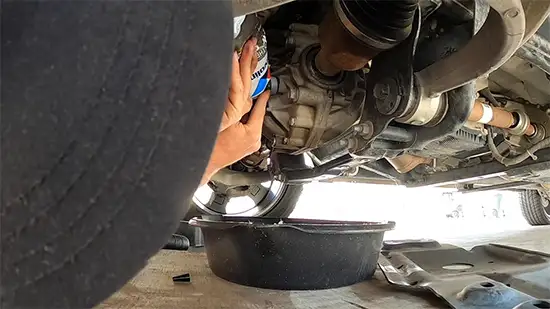
The answer varies depending on the make, model, and year of your car, as well as the size and type of gearbox. For instance, a smaller car with a manual transmission will require less gear fluid than a larger car with an automatic transmission.
To find out exactly how much gear fluid your car needs, consult the factory specifications for your specific make and model. In most cases, you can check the fluid level by removing the fill plug and topping off the fluid until it begins to run out.
Some cars also have a bleed hole that will indicate when the proper level has been reached. Ultimately, keeping your car properly lubricated will prolong its lifespan and keep running smoothly for miles to come.

When changing your axle gear oil, selecting the right place to do it is important. You’ll need a well-ventilated area with plenty of space to move around. You’ll also need a few supplies, including:
After you have all the necessary supplies, follow these steps:
1. Park your car on a level surface and set the emergency brake.
2. Remove the fill plug from the gearbox using a socket wrench.
3. Place the catch basin under the drain plug and remove it to drain the old oil.
4. Clean the area around the fill and drain plugs.
5. Insert the funnel into the fill plug hole and add the new gear oil, slowly pouring it in until it starts to run out of the fill hole.
6. Replace the fill plug and tighten it with a socket wrench.
7. Repeat steps 2-6 for the other side of the axle (If you have double-ended axles).
8. Check the oil level in the axle and add more if necessary.
Your gear oil must be changed every 30,000 miles if you’re towing, driving in low traction, or driving in the mountains. Gear oil helps protect your car’s transmission by lubricating the gears and bearings.
As the oil breaks down, it’s less effective at lubricating the transmission. This can cause the transmission to work harder, leading to premature wear and tear.
You can typically go up to 80,000 miles before you need to change the gear oil if you don’t frequently tow or drive in extreme conditions.
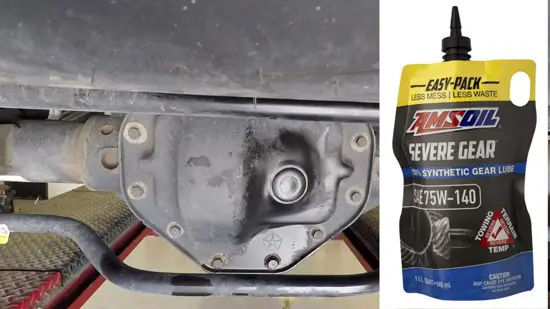
Gear oil is important for several reasons. It helps to lubricate the gears, prevents corrosion, and keeps the overall differential cooler. When the fluid level is low, it can cause the gears to grind and wear down, leading to big problems.
Low differential fluid can also cause the bearings to fail, resulting in power loss and a complete rebuild. If you have never done a gearbox rebuild before, it is best to leave it to the professionals. It takes a lot of practice to get good at it, and there is a lot of “feel” involved.
Many believe that gear fluid is only necessary for vehicles with automatic transmissions. This isn’t always the case. Some manual transmissions require the best gear oil for towing to function correctly.
Consult the owner’s manual to determine whether your vehicle needs gear fluid. This document will list all of the fluids that are necessary for the proper operation of your vehicle. If gear fluid is not listed, then it is not required.
If you want to prevent damage to your transmission, ensure the fluid level is at the correct level, regardless of whether it is listed.
To assist you, we have already provided you with the top five gear oils for towing your needs. Choose the one that fits your car and feel the difference when towing.